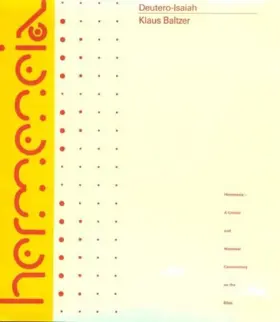

Deutero-Isaiah
in Hermeneia
Pages
597
Publisher
Fortress Press
Published
1/1/2001
ISBN-13
9780800660390
Reviews
Careful linguistic analysis of the chapters, assumes the rhetorical form of a Greek drama.
[Full Review]
Response to the reviews by Reinhard G. Kratz, RBL 5 (2003), and Benjamin D. Sommer, RBL 4 (2002); JBL 123 (2004). 1. Reinhard G. Kratz�s critic ism raises questions that require discussion, for they are related to fundamental questions about historical-critical research, the presuppositions and consequences of which call for debate. Here we can follow the accepted �canon� of exegetical methods. But what has meanwhile crystallized into this �canon� has behind it a complex and extensive history, and knowledge of this history can be of help when we attempt to discern the potentialities and limitations of the methods involved. Today�s globalization in the field of scholarship too has brought new methods and challenges, and through these above all the recognitions and acquisitions of these �European traditions� can be helpful. These traditions begin with textual criticism and the comparison of manuscripts and translations. Literary criticism became necessary at the time when Herder�s interest in popular traditions lent the biblical texts new importance as documents of Jewish tradition. With the Aufkl�rung, the laity no longer allowed themselves to be pushed aside through the interpretative monopoly of �professional� theologians. Theologians are as a rule primarily interested in the legitimating function of the texts, whereas the so-called laity need their communicative function as a way of finding a language for their own experiences (see the Psalms especially). This interpretative monopoly on the part of the theologians appears in teachings about the sacred character of the texts (the doctrine of inspiration, etc.
[Full Review]
(Presently Fellow of the Wissenschaftskolleg/Institute for Advanced Study, Berlin)Ever since historical research recognized the fact that Isa 40–66 could not have been fromthe prophet Isaiah (J. C. Döderlein, J. G. Eichhorn), scholars now speak of a “SecondIsaiah” or “Deutero-Isaiah.” It was B. Duhm in his commentary of 1892 (2d ed. 1901; 3ded. 1914, 4th ed. 1922) who limited Deutero-Isaiah to Isa 40–55, discovering in Isa56–66 yet a “Third Isaiah” or Trito-Isaiah. Today the tendency is to stress theconnectedness of the three parts within the framework of Isaiah as a whole (R. F.Melugin, R. Rendtorff, C. R. Seitz, M. Sweeney, among others), as is the case in F.Delitzsch’s commentary (4th ed. 1889). This development is thanks to the newercanonical approach, which is based on the real evidence—on the available final text ofthe Masoretes. In his commentary, which appeared in both English and German in 1999,Klaus Baltzer chose a third path. Along with Duhm and the majority of other exegetes,Baltzer—whom H. Koester and F. M. Cross recruited in 1962 for the commentary toDeutero-Isaiah and who began the work in Munich in 1968 (xix)—distinguishes Isa40–55 from the remainder of the text. Like F. Delitzsch, J. Muilenburg and W. A. M.Beuken (xix) and many others, he restricts himself exclusively to that final text of theMasoretes encompassing Isa 40–55. The literary links to the book of Isaiah are brieflytouched upon (1–2), though they are not followed up.This self-limitation is justified, as Isa 40–55 contains enough riddles for the exegete. Tosolve them, present-day commentators will soon require more pages than Delitzsch orDuhm needed for all of Isaiah.
[Full Review]
More than a commentary in the typical sense, this work represents the most originalcontribution to the study of Isa 40–55 in the past half century. It moves decisively beyondthe current scholarly consensus in three ways. Baltzer argues that Isa 40–55 is a liturgicaldrama, a text performed by actors with roles that can be reconstructed. Second, Baltzermaintains that these chapters were written in Jerusalem during the last half of the fifthcentury rather than in the Babylonian exile during the last part of the sixth. Finally,Baltzer suggests that the servant in Isa 42; 48; 50; and 53 (one of the main dramatispersonae) is none other than Moses. These theses are exciting and creative.Unfortunately, none of them receives any serious support. Nevertheless, Baltzer’s focuson dramatic elements in these chapters highlights the vivid nature of Deutero-Isaiah’srhetoric and the crucial role of dialogue in these speeches, and thus this commentarycontributes to the literary analysis of these texts. At the same time, precisely because ofthe bold and speculative nature of Baltzer’s proposals, this book raises central questionsregarding what should count as evidence in biblical studies, which will constitute mymain focus in this review essay.Throughout the commentary, Baltzer assigns speeches to various actors and a chorus, andhe finds hints regarding their movements on stage. The absence of any rubrics in our textidentifying the speakers and these actions is not in itself surprising; after all, the oldestmanuscripts of Greek drama do not specify which characters speak which lines.
[Full Review]

